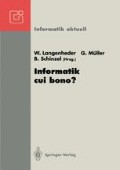Zusammenfassung
Mit der Wiederentdeckung des arbeitenden Menschen als Gesamtpersönlichkeit haben sich die Anforderungen an die Gestaltung des Arbeitsplatzes und an die Arbeitsorganisation geändert. Das bedeutet den Abschied von der Vorstellung des Arbeitenden als „Schräubchen im Getriebe“; stattdessen wird dem Einzelnen die Möglichkeit gegeben, innerhalb einer Arbeitsgruppe verschiedene Tätigkeiten in Abstimmung mit den Gruppenmitgliedern auszuführen und zwar autonom und verantwortlich.
Access this chapter
Tax calculation will be finalised at checkout
Purchases are for personal use only
Preview
Unable to display preview. Download preview PDF.
Literatur
Agha, G., Houck, G., Panwar, R.: Distributed Execution of Actor Programs, in: Banerjee, U. et al. (eds): Languages and Compilers for Parallel Computing, LNCS 589, Springer-Verlag, Berlin etc. 1992.
Brauer, W.: Was ist Informatik? Studienführer Informatik des Fachbereichs Informatik der Universität Hamburg 1981 und folgende Jahre.
Brauer, W.: Von der sequentiellen zur parallelen Verarbeitung, HMD — Theorie und Praxis der Wirtschaftsinformatik, 25. Jahrgang, Heft 150, Nov. 1989, pp. 15 – 25.
Brauer, W.: Grenzen maschineller Berechenbarkeit, Informatik-Spektrum 13 (1990) pp. 61-70.
Brauer, W.: The New Paradigm of Informatics, in: Maurer, H. (Hrgb.), New Results and New Trends in Computer Science, Lecture Notes in Computer Science, vol. 555, Springer- Verlag, Berlin 1991, pp. 15–24.
Brauer, W., Hernandez, D. (eds): Verteilte künstliche Intelligenz und kooperatives Arbeiten, Proc. 4. Internationaler GI-Kongress „Wissensbasierte Systeme“, Springer-Verlag, Berlin etc. 1991.
Brauer, W., Reisig, W., Rozenberg, G.L (eds): Petri Nets: Central Models and Their Properties. LNCS Bd. 254 und Petri nets: Applications and Relationships to Other Models of Concurrency. LNCS Bd. 255, Springer-Verlag, Berlin 1987.
Curtis, B., Krasner, H., Iscoe, N.: A Field Study of the Software Design Process for Large Systems, Comm. ACM 31 (1988) 11, pp. 1268–1287.
Dijkstra, EW.: Solution to a problem in concurrent programming control, Comm. ACM 8, 9 (Sept. 1965), p. 569
Fischer, G., Lemke, A.C., Mastaglio, T., Morch, A.I.: The Role of Critiquing in Cooperative Problem Solving, ACM Trans. Information Systems 9 (1991), pp. 23–151.
Fuchs, J.: Vom Taylorismus zum Organismus — wie Unternehmen leben lernen, IBM-Nachrichten 42 (1992) Heft 308, pp. 14–23.
Floyd, Ch., Züllighoven, H., Budde, R., Keil-Slawik, R., Software Development and Reality Construction, Springer-Verlag, Berlin 1992
Güntsch, F.R., Händler, W.: Zur Simultanarbeit bei Digitalrechnern, Elektronische Rechenanlagen 2 (1962), 117.
Jarke, M., Pohl, K.: Information Systems Quality and Quality Information Systems. Erscheint in Proc. EFIP WG 8.2 Working Conference on the Impact of Computer-Supported Techniques on Information Systems Development, North-Holland, Amsterdam 1992; auch erhältlich als Aachener Informatik-Bericht Nr. 92–7, Fachgruppe Informatik, RWTH Aachen.
Jarke, M.: The Design of a Database for Multiperson Decision Support, Ann. of Operations Research, 16 (1988) pp. 393–412.
Jarke, M., Maltzahn, C., Rose, Th.: Sharing Processes: Team Coordination in Design Repositories. Erscheint im ersten Heft des Internat J. of Intelligent and Cooperative Information Systems; auch erhältlich als Aachener Informatik-Bericht Nr. 92–5, Fachgruppe Informatik, RWTH Aachen.
Lewe, H., Krcmar, H.: Groupware, Informatik-Spektrum 14 (1991), pp. 345-348.
Milner, R.: Communication and Concurrency Prentice Hall, New York etc, 1989.
von Neumann, J.: Theory of Self-Reproducing Automata. Edited and completed by A.W. Burks, Univ. of Illinois Press, Urbana, Illinois, 1966.
Norman, D.A.: Collaborative Computing: Collaboration First, Computing Second, Comm. ACM 34 (1991) 12, pp. 88–90.
Petri, C.A.: Kommunikation mit Automaten, Rhein-Westfal. Inst f. Instrumentelle Math. a.& Universität Bonn, Schrift Nr. 2, 1962. English translation: Communication with Automata Giffiss Air Force Base, New York, Techn. Rpt RADC-TR-65–377, vol.1, Suppl. 1, 1966.
Petri, C.A.: Grundsätzliches zur Beschreibung diskreter Prozesse, in: Händler, W., Peschl, E., Unger, H. (eds): 3. Colloquium über Automatentheorie, Birkhäuser-Verlag, Basel etc. 1965, pp. 121–140.
Petri, C.A.: Kommunikationsdisziplinen, in Petri, C.A.(Hrsg.): Ansätze zu einer Organisationstheorie rechnergestützter Informationssysteme. Berichte der Gesellschaft für Mathematik und Datenverarbeitung 111, Oldenbourg-Verlag, München 1979, pp. 63–76.
Randell, B. (ed.): The Origins of Digital Computers, third edition, Springer-Verlag, Berlin etc. 1982.
Retz-Schmidt, G.: Die Interpretation des Verhaltens mehrerer Akteure in Szenenfolgen Informatik-Fachberichte Bd. 308, Springer-Verlag, Berlin etc. 1992.
Rose, Th.: Entscheidungorientierte Versionen — und Konfigurationenverwaltung, Informatik- Fachberichte Bd. 305, Springer-Verlag, Berlin, 1992.
Schwefel, H.-P., Männer, R., (eds.): Parallel Problem Solving from Nature, LNCS vol. 496, Springer-Verlag, Berlin etc. 1991.
Sriram, D., Logeher, R., Fukuda, S. (eds.): Computer-Aided Cooperative Product Development, LNCS vol. 492, Springer-Verlag, Berlin etc. 1991.
Turing, A. M.: On computable numbers, with an application to the Entscheidungsproblem, Proc. London Math. Soc. 42 (1936), pp.230–265.
Vester, F: Kommunikation-ein vernetztes Denken, Springer-Magazin „Kommunikation kennt keine Grenzen“, Springer-Verlag, Berlin etc. 1992, pp. 22–25.
Voss, K., Genrich, H.J., Rozenberg, G. (eds.): Concurrency and Nets, Springer-Verlag, Berlin etc. 1987.
Warnecke, H.-J.: Die fraktale Fabrik. Effiziente Kommunikation für die Produktion vonmorgen. Springer-Magazin „Kommunikation kennt keine Grenzen“, Springer-Verlag, Berlin etc. 1992, pp. 56–62. (vgl. den Hauptvortrag von Warnecke auf der Gl-Jahrestagung 1992 mit dem Titel „Die Fraktale Fabrik — Produzieren im Netzwerk“)
Winograd, T.: Where the Action Is, Byte 13 (1988), pp. 256A–258.
Zuse, K.: Der Computer — Mein Lebenswerk, Springer-Verlag, Berlin etc. 1984.
Author information
Authors and Affiliations
Editor information
Editors and Affiliations
Rights and permissions
Copyright information
© 1992 Springer-Verlag Berlin Heidelberg
About this paper
Cite this paper
Brauer, W., Brauer, U. (1992). Wissenschaftliche Herausforderungen für die Informatik: Änderungen von Forschungszielen und Denkgewohnheiten. In: Langenheder, W., Müller, G., Schinzel, B. (eds) Informatik cui bono?. Informatik aktuell. Springer, Berlin, Heidelberg. https://doi.org/10.1007/978-3-642-77808-7_2
Download citation
DOI: https://doi.org/10.1007/978-3-642-77808-7_2
Publisher Name: Springer, Berlin, Heidelberg
Print ISBN: 978-3-540-55957-3
Online ISBN: 978-3-642-77808-7
eBook Packages: Springer Book Archive

